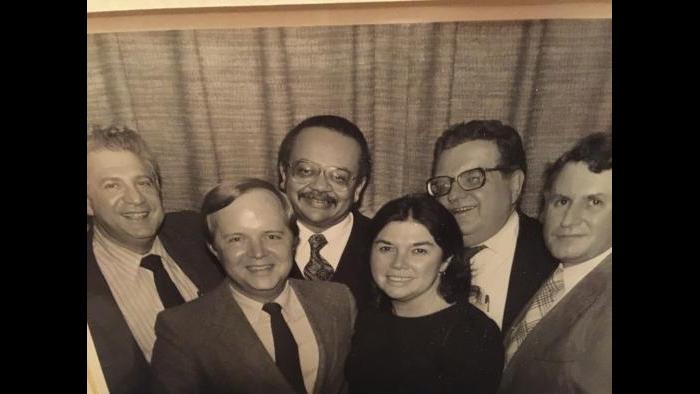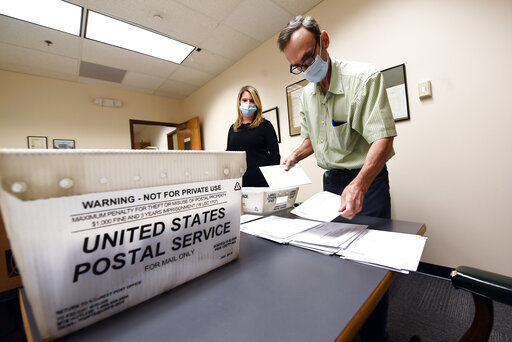Advertisement
“All I was trying to do was make things better, or as Trump would say, make America great again,” said a mayor who was accused of improperly selling a police cruiser to settle a city debt.

Not many Americans can tell you what it feels like to be impeached, but Dana Williamson knows. And along with the rest of the country, Mr. Williamson, a former mayor of Raceland, Ky., has had impeachment on his mind a lot recently.
To be clear, he was never tarnished with an accusation of soliciting help from a foreign power to improve his political chances. What he was accused of doing was much more local: improperly selling a police cruiser to settle a city debt.
“It was just unreal,” Mr. Williamson, 52, said of the City Council’s unanimous vote to remove him from office in 2011. “All I was trying to do was make things better, or as Trump would say, make America great again.”
On the national level, impeachment is a rarely used power of Congress. Just two presidents have been impeached, and neither was removed from office. Other federal officials can also be impeached, but only eight people, all of them judges, have been convicted by the Senate.
In America’s small towns, though, where trivial feuds can overpower a city’s agenda, mayors who flout local tradition — or the law — can quickly find themselves booted from government.
Now, with Democrats ramping up their impeachment inquiry into President Trump, the constant chatter about whether he committed high crimes and misdemeanors is sending shudders of recognition through the small group of elected officials who have been forcibly removed from their posts in recent years.
Mr. Williamson was only in charge of Raceland, a small city in eastern Kentucky, for six months before he was kicked out of the job, which pays $200 a month. The constant flood of impeachment news has given him a growing sense of kinship with Mr. Trump, whom he says he will “no doubt” vote for in 2020.
“It kind of hit home,” Mr. Williamson said of the investigation of Mr. Trump. “They’re going to get ammunition on him, just like they did with me.”
When he was impeached, he acknowledged that he should have consulted the council about the sale of the police car, and he waived his right to a hearing, saying he did not need the headache. He left office without a fight.
Afterward, Mr. Williamson, a retired sheet metal mechanic and archery coach, washed his hands of local politics. He has gone to only one council meeting since then — it was a special meeting about road paving — and he has largely stopped monitoring the political minutiae of the city of about 2,300 people.
Often, mayors facing impeachment resign before the City Council takes formal action against them — either succumbing to public pressure, as Baltimore’s mayor did this year, or as part of a plea agreement with prosecutors, like the one Nashville’s mayor accepted last year.
When scandals do result in impeachment, the hearings can be difficult for local officials to navigate, given that there is no standard procedure that spans the more than 19,000 municipal governments in the United States, according to Kimberly Nelson, a professor of public administration at the University of North Carolina at Chapel Hill.
“When officials are removed at a local level, sometimes it’s petty and sometimes it’s serious,” Professor Nelson said. “It may be because they’ve committed a crime, or because they’re making it impossible to function.”
Sometimes impeachment does not scuttle a mayor’s prospects at all, proving that there can be political life — and even re-election — after rivals seek to have leaders removed from office.
Diana Broderson took the mantle as mayor of Muscatine, Iowa, in January 2016, having never held political office before. A year into her term, the City Council began accusing her of exceeding her authority, and it unanimously voted to impeach her in May 2017.
“There was a group of people who didn’t want me in office, and they voted to take me out of office illegally,” said Ms. Broderson, a Democrat, speaking with the same defiant attitude that has electrified Mr. Trump’s base.
But Ms. Broderson and her supporters — who labeled the investigation of her a “witch hunt” — were buttressed by a judge who ruled that her impeachment was unfair and reinstated her as mayor.
“The difference between me and Donald Trump is, I opened it up and said, ‘If you can find any wrongdoing, I will gladly accept that as my responsibility,’” she said.
Ms. Broderson has been in office ever since, running the city of about 24,000 along the Mississippi River. She won re-election six months after the impeachment, while two of the councilmen who had tried to expel her were voted out.
Even though Ms. Broderson supports the inquiry into Mr. Trump, the trauma she endured and the speed with which the impeachment inquiry usurped other city business make her more cautious about the matter than some on the left.
“There’s a big cost involved, so you better be pretty right,” she said. “It almost can shut down a government.”
Adam Paul, 39, knows about that. Less than a year after he became mayor of Ellisville, Mo., in 2012, City Council members and scores of citizens packed an elementary school gymnasium for days of impeachment hearings, which resulted in Mr. Paul’s removal.
Mr. Paul does not support Mr. Trump, but he acknowledges that he and the president share some overlapping qualities: a brash style, a populist message and an unwillingness to play by the rules of previous administrations.
“I’m not sure I’m proud of saying this, but we’re very much similar where we come out,” Mr. Paul said.
Mr. Paul surprised voters and himself when, at 31, he won an election the first time he threw his hat in the ring. He ran as an independent and campaigned on a single issue: stopping Walmart from getting a tax credit to open a store in the city, a St. Louis suburb of about 10,000.
During the battle over the Walmart store, members of the City Council accused Mr. Paul of revealing city secrets, exceeding his authority, and drinking and swearing on the job. A circus ensued. He denied most of the charges — except for the swearing, which was not an impeachable offense — and took a lie-detector test, but the council impeached and removed him in 2013.
But within three months, a St. Louis judge reinstated him as mayor, and he plowed ahead, winning re-election in 2015. The Walmart was never built.
“We stopped the Walmart development, but it was a lot of political infighting, a lot of Kabuki, a lot of well-paid lawyers and a lot of wasted time,” Mr. Paul said.
In recent weeks, as his wife and friends have been ribbing him about his own impeachment, Mr. Paul has been following the news out of Washington with an unusual level of understanding.
“I’m looking at it from the inside, looking out,” he said. “I’ve been through it.”
Mr. Paul’s political career began and ended in Ellisville’s one-story brick municipal building. He resigned in 2018 to take a job in Southern California, where he now negotiates contracts for a technology company.
“My wife said if I’m ever in politics again, she’d divorce me,” Mr. Paul recalled. “And I said, ‘Deal.’”
Nicholas Bogel-Burroughs reports on national news. He is from upstate New York and previously reported in Baltimore, Albany, and Isla Vista, Calif. @nickatnews

